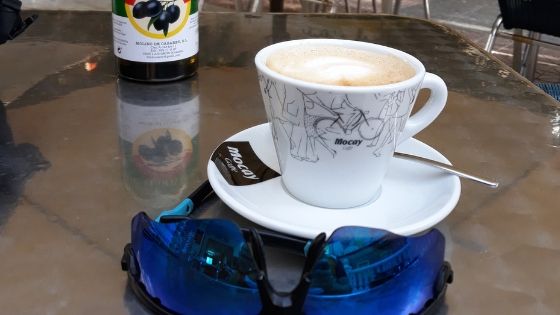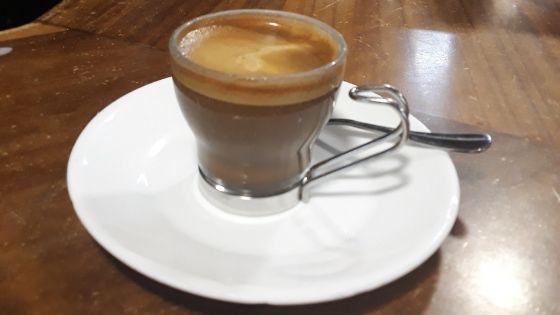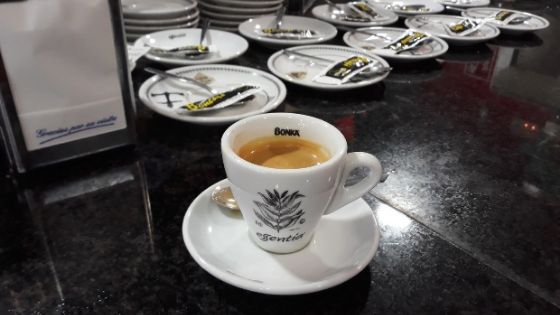
Three-quarters of the way through my Saturday long run this past weekend I linked up with my friend Julie at a coffee shop in a small village six miles from where we live. Julie was mid-way through her shorter run and we planned to run the last section of the trail together. I ordered a flat white while Julie did not deviate from her usual sparkling water with a slice of lemon.
I asked Julie if it was that she did not like the taste of coffee or was there some other reason that she avoided the performance boost that caffeine can give. Julie was dubious as to whether that could apply to trail runners, especially those as slow as us. So we took to Google to find out more.
Does coffee make you trail run faster? It’s no secret that caffeine can be a huge performance enhancer for many athletes. Between 1984 and 2004 WADA, the world anti-doping association even had a limit on the amount of caffeine that an athlete could consume pre-competition.
Extensive Sport Science Research
The good news about WADA removing the limit on caffeine consumption was that it allowed sports scientists to do extensive research into the performance benefits at various caffeine levels. The research also lifted the lid on the huge variances in caffeine metabolism rates that caused a spate of false-positive tests that undermined how the WADA rule could be applied.
Thanks to that research we now have the data to work out how much coffee you need as well as when best to drink your performance boosting coffee.
Pre-Run Coffee
Your coffee, well the caffeine actually, is what’s known as a psychoactive stimulant. Caffeine is metabolized by the liver and the effects kick in after between 30 and 45 minutes. So swallowing your espresso as the gun goes off will not help you get to the first section of single-track ahead of everyone that drank theirs a bit earlier.
I remember seeing a report where it was suggested that taking caffeine pills before your A race is the number one legal performance-enhancing product available to runners. Personally I wouldn’t recommend caffeine pills or powders as overdosing on caffeine still comes with very negative health consequences. Then again I run trails for enjoyment and health, not as a means to earn a living from prize money.

Mental Alertness
If you are like me, you know that your morning cup of coffee sharpens your mental alertness. For full disclosure, I have a cup of coffee to my right as I type this blog post.
That extra mental boost is a great benefit on a morning where you have to face a difficult speed workout but feel as if you can hardly get yourself to the door, let alone out and running.
You know those feel-good brain chemicals that kick in during a hard workout including when you head out for a run. Yes, I am talking about endorphins. Caffeine increases endorphin levels which means that you are almost half-way to a runners high while you are still lacing up your sneakers.
Once you are out running caffeine reduces your perception of effort. That means that the same level of effort makes you feel less fatigued.
One of the key reasons you slow down is that you start to feel tired before actual muscle fatigue sets in. This gives you a little reserve energy for that emergency fight or flight situation. Caffeine blocks those “feeling tired” sensations, allowing you to go deeper for longer.
Boosting Fat-Burning As A Fuel Source
As we already know, caffeine can give you that extra boost when you are running shorter distances. However, there is a completely different application for caffeine in marathons or even ultra distances.
In marathon racing, the last six miles are generally called the second half of the race. That is because the first twenty miles completely drain you of all your glycogen reserves. Many runners then grovel through the final six miles on little more than willpower.
If there was a way to use more body fat as a fuel source during the first twenty miles, that will leave you more glycogen in your system for the final six miles when you need the glycogen to fuel that final push to the finish line.
That is where Ketone Esters made a massive difference at the top end of our sport because they did exactly that, very very well. A bottle of Ketone Esters takes just under 60 minutes to kick in. That means ideally you drink one bottle an hour before the start of your marathon and another just before the gun goes off. You will then need more Ketones as part of your nutrition strategy to delay the onset of glycogen use.
The problems with Ketone Esters are essentially two-fold. The first is the cost. Back when they first came out they cost over $100 per single-use unit. Lately, the cost has come down to around $40. Even though this is better, it is still an expensive sports nutrition option. The second is the taste. It amazes me that all the athletes that use Ketones are not all puking along the roadside.
The good news is that caffeine also enhances your body’s use of fat as fuel. It may not be as effective as Ketone Esters at switching you to only using fat for fuel, but in my mind, it does a good enough job. For me, the bonus is that caffeine tastes a lot better than Ketones and is way cheaper. Plus, let’s be honest, I am not chasing any records.
The one part that is not clear as yet is exactly how caffeine increases the utilization of fat as a primary fuel source. The consensus among researchers is that caffeine increases the number of fatty acids in your blood. This will cause a relatively higher ratio of fatty acids to glycogen in your blood.
Somehow, your marathon running body then starts using these extra fatty acids as fuel in place of the glycogen, saving the glycogen for later. Exactly why this happens is something that needs additional sports science research.
My layman theory is that much of marathon and ultra-distance running is done at closer to your aerobic threshold than your lactate threshold. It is well known that aerobic effort is more conducive to fat burning.
To my mind, this is good news for two reasons. The first is that it is reassuring to know that I can run further and longer before my glycogen gets totally depleted and I hit the familiar wall. The second is that burning more fat to fuel my run means a good chance that I’ll be shedding a couple of pounds in the process.

Improved Power And Long Distance Speed
Reaction time is impacted by how quickly your brain can send a signal to your muscles telling them to contract. While neuromuscular coordination is the system used to reset your muscle fibers, ready for the next contraction. This is commonly referred to as your muscles relaxing between contractions.
Caffeine improved the speed at which both of these nerve signals fire. Not only is this good news if you are a 200m sprinter, but it also deals with how well you recover from your feet slipping or tripping over something. More often than not it has only been my reaction time that has prevented me from plowing face-first along the trail.
Caffeine And Heat Tolerance In Trail Running
Back in 2007, a study was published in the International Journal of Sports Nutrition regarding caffeine and heat tolerance. Although the double-blind study was done on cyclists, the conclusion was that the results could be applied across endurance sport in general.
In the study, sixteen highly trained cyclists were given one of three identical tasting drink bottles while doing a 135-minute interval training session in hot and humid conditions.
One bottle contained a carbohydrate and electrolyte sports drink. The second had the same carbohydrate and electrolyte mix but with added caffeine. The third bottle contained plain water with a placebo to produce the same flavor as the other two bottles.
Each cyclist performed the test three times, once with each of the drink types. The drinks were allocated randomly so that neither the cyclists nor the testers knew which drink was being tested.
The cyclists all were able to produce a workload between 15% and 23% higher while drinking the caffeine-laced sports drink. These higher workloads were all produced at a lower level of perceived exertion.
How Much Faster Can Your 5k Be?
So far we have been looking at how caffeine improves different aspects of athletics performance.
However, we are never doing only one aspect of athletic performance at a time. What we do is combine those finely tuned aspects together into feats of exceptional performance. For me, that perfect harmony of excellence seldom lasts more than thirty seconds during a run. Can caffeine change that?
Luckily for us, a group of sports scientists asked the same question and put it to the test.
The team took two groups of runners with 15 runners in each group. The first group was made up of well-trained runners while the second group comprised recreational runners.
Each runner completed two 5km time-trials. For each run, they were randomly given either caffeine or a placebo. Neither the runners nor the testers knew which of the two runs each of the runners was randomly given their caffeine.
The outcome was significant in that all 30 runners recorded faster times after taking caffeine. However, in real terms the improvement was small. By small I mean it is not the type of improvement that will make a difference to my life. Then again, I am not an elite professional runner where a handful of seconds will impact on whether I can pay the rent or not.
In percentage terms, the recreational runners averaged a 1% improvement in their 5k time. Conversely, the well-trained runners showed an average 1.1% improvement.
At first glance, it looks as if the well-trained runners got a bigger advantage than the recreational runners. However, you need to remember that the recreational runners had a slower base 5k time than the well-trained runners.
All of the well-trained runners were sub-20 athletes while all of the recreational runners had 5k times slower than 20 minutes.
All 30 athletes showed an average improvement of between 11 and 15 seconds for their 5k time trial when on caffeine. That equates to between two and three seconds per kilometer.

Using Caffeine To Speed Recovery Time
I can clearly remember all those insanely long training days on the bike during my years of cycling and triathlon. I’d roll into a gas station convenience store completely spent. Thinking back now I must have been quite the sight, my sweaty ashen face, and hand tremors.
I’d slam down a coke and in as little as five minutes I’d recover enough to make my way back home. I always believed that this was thanks to the sugar spike that got some glycogen into my system that would fuel the last part of my training.
Now, thanks to the research done by a team at the School of Medical Sciences in Victoria, Australia, I now know that there were greater forces at work during my gas station stops.
The research that the Australian team did, involved seven trained athletes. The experiment was set up using the randomized, double-blind crossover design. The starting point for each experiment involved having the subjects complete exhaustive fasted exercise at lactate threshold thereby depleting their glycogen reserves.
Each athlete was either given a carbohydrate recovery drink of 4g/kg of body weight or the same carbohydrate combined with 8mg/kg of body weight.
Starting before drinking their recovery drink muscle biopsies and blood samples were taken at regular intervals over a four hour period of passive recovery. In all instances, muscle glycogen was at a similar low level of 75mmol/kg dry weight.
The outcome was that including caffeine in the recovery drink increased the rate of glycogen resynthesis by a staggering 66%. Interestingly, protein resynthesis was the same for all time points for both with and without caffeine. So it seems that it is just carbohydrate synthesis that is impacted by caffeine during post-workout recovery.

What About Caffeine And Dehydration?
I remember back in my mountaineering days being warned against the risks of dehydration associated with drinking coffee.
Then, I read an Everest book that changed my perspective. If memory serves I think it was On Top Of The World by Rebecca Stephens. In the book, she mentioned that she couldn’t stand the taste of tea. I know, a British that doesn’t like tea is an unusual concept. So instead of tea, she drank coffee as her hot beverage of choice and it did not impact her ability to summit the highest mountain in the world.
Thanks to Professor Lawrence E. Armstrong Ph.D. and his team at the University of Connecticut we have not one, but two clinical studies looking into how caffeine impacts dehydration during intense physical activity.
As is the norm, both studies were double-blind, placebo-controlled, crossover studies.
The experiments compared caffeinated beverages compared with water that was similarly flavored.
The results were so surprising that I had to re-read them multiple times because I was convinced that I was somehow not reading the data correctly.
The first study was published in the international journal of Sports Medicine in June 2002. It was a simple, rested, fluid-in vs fluid-out test. Measurements were taken of the volume of fluid ingested compared to the volume of urine produced by each test subject.
On average the subjects had a fluid-retention of 0.81% when drinking water. The interesting fact emerged when analyzing the data from the caffeine drink. Subjects maintained a fluid-retention of 0.84% from the caffeine drink. Therefore caffeine is marginally less dehydrating than water. That was not the result I was expecting.
During the second study, published in the International Journal of Sports Medicine in July 2007, measurements were taken on test subjects during physical activity. An additional parameter was added, checking for electrolyte imbalances as well.
The outcome was largely the same. Total fluid retention levels matched those in the first experiment when adjusted for the subjects’ normal sweat rates. Likewise, there were no substantive fluctuations in electrolyte levels between drinking water or the caffeine drink.
How Much Caffeine is too much?
That same earlier study that I talked about relating to improving your time over the distance of a 5k, also looked into the amount of caffeine that produced the ideal performance kick.
That outcome showed that two milligrams of caffeine per pound of body weight. That seems super simple until you try and figure out how much caffeine is in the coffee that you are drinking.
The USDA has pegged the caffeine level of espresso as 64mg of caffeine in a standard shot of one fluid ounce. That seems overly simple. Just get on the scale and you will know how many shots of espresso you should have. In the real world, however, things are seldom that simple.
The website Caffeine Informer cites a study that was done in Queensland Australia and published in the Journal of Food and Chemical Toxicology.
Ninety-seven espresso samples were obtained from commercial retail outlets along Australia’s Gold Coast and analyzed. Tests revealed caffeine levels ranging from 25mg at the weakest up to 214mg at the strongest in a single cup of espresso.
The good news is that all of this data has allowed us to bring things back down to some simple numbers. It turns out that each gram of ground coffee produces between ten and eleven milligrams of caffeine once infused into a shot of espresso.
The USDA figure is based on a 6g shot of espresso. What I have noticed is that in France they generally use 7g of coffee in each shot of espresso. In Spain, that number jumps to 12g of coffee while the Italians use 16g of coffee in their espresso. That also explains why my Italian friends say that to them, French coffee tastes like dishwater.
Therefore if you ask your barista how many grams of coffee that he/she uses, you will be able to work out how many cups you can safely ingest for your performance boost.
Should You Tank-Up With Caffeine Every Day?
You now know that caffeine has distinct performance-enhancing properties. So then the logical next step is to fill yourself to the gills with espresso every day because somewhere you heard that more is better. Well, not so fast.
The trouble with caffeine is that you are able to build up a tolerance to the stimulating effect.
This means that if you fill up with caffeine before each and every workout you will be getting less and less of a boost each time. Do this for long enough and you will hardly get any benefit at all by the time you get to race day.
The good news is that if you do lay off the caffeine a bit during training you will get a bigger boost from the same dose of caffeine on race day. In addition, caffeine is absorbed quickly and the effects can last for up to a couple of hours. This means that you can have your coffee as little as ten to fifteen minutes before the gun goes and still reap the rewards.

How Safe Are Caffeine Pills and Powders?
Before we get into the core of other types of supplementation it is important to note that you do not have an unlimited ability to cope with the effects of large amounts of caffeine.
The common consensus is that ten grams of caffeine will be a fatal dose for most people. If we average out all the strengths of espresso we talked about earlier to 100mg of caffeine per shot, which equates to drinking 100 shots of espresso all at once. I cannot imagine being able to hold down anywhere near that much espresso.
So the chance of a fatal dose of caffeine from coffee alone is almost impossible. However, the same cannot be said for pills and powder supplements.
Caffeine powders and pills are made using pure caffeine extract in very high concentrations. Therefore the amount of caffeine in various pills and powder supplements can vary widely.
A case in point is the tragic story of 22-year-old Lachlan Foote from New-Year’s Day in 2018. The pure caffeine powder that he had contained 5000mg (5g) of caffeine per teaspoon. That is half the lethal dose per teaspoon. He used the scoop-spoon from his protein powder to add caffeine powder to his protein shake, accidentally ingesting close to triple the lethal dose in a single protein shake.
So if you cannot stomach the taste of coffee and are looking to get your caffeine from a supplement, please read all of the labels very carefully and make sure that everyone in your house knows the risks. This is especially important when dealing with caffeine powder as it looks exactly like powdered sugar.
With all of that being said, I have my long run in the morning and there is a rustic coffee bar about a mile and a half from the trailhead. I’ll be stopping in there to put all of my new caffeine performance-boosting knowledge to the test. How about you?

Thank you, Sir!